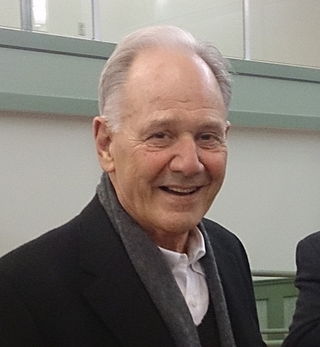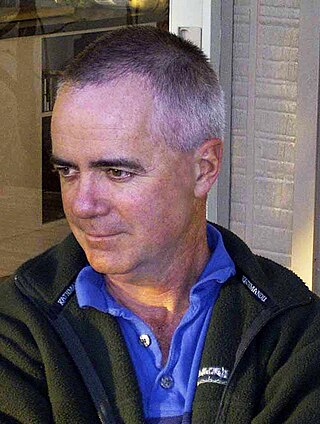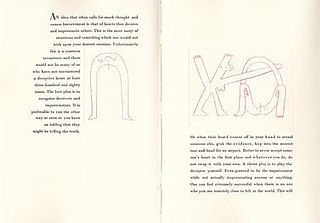Scratchboard or scraperboard or scratch art is a form of direct engraving where the artist scratches off dark ink to reveal a white or colored layer beneath. The technique uses sharp knives and tools for engraving into the scratchboard, which is usually cardboard covered in a thin layer of white China clay coated with black India ink. Scratchboard can yield highly detailed, precise and evenly textured artwork. Works can be left black and white, or colored.

Alexander McPhee Miller is an Australian novelist. Miller is twice winner of the Miles Franklin Award, in 1993 for The Ancestor Game and in 2003 for Journey to the Stone Country. He won the overall award for the Commonwealth Writer's Prize for The Ancestor Game in 1993. He is twice winner of the New South Wales Premier's Literary Awards Christina Stead Prize for Conditions of Faith in 2001 and for Lovesong in 2011. In recognition of his impressive body of work and in particular for his novel Autumn Laing he was awarded the Melbourne Prize for Literature in 2012.
Carmel Bird is an Australian writer of novels, short stories and essays. She has written books on the art of writing, and has edited anthologies of essays and stories. In 2016, she was awarded the Patrick White Literary Award.

Robert Hollingworth is an Australian artist and writer.
Hugh Roger McDonald is an Australian author of several novels and a number of non-fiction works. He is also an accomplished poet and TV scriptwriter.
Janine Burke is an Australian author, art historian, biographer, novelist and photographer. She also curates exhibitions of historical and contemporary art. She is Honorary Senior Fellow, Faculty of Fine Arts and Music, University of Melbourne. She was born in Melbourne in 1952.
Sophie Cunningham is an Australian writer and editor based in Melbourne. She is the current Chair of the Board of the Australian Society of Authors, the national peak body representing Australian authors.
Sarah Hopkins is an Australian criminal lawyer and novelist. She is a lawyer with the Aboriginal Legal Service in Sydney and chairperson of Just Reinvest NSW, a not for profit organisation that works to reduce the overrepresentation of Aboriginal and Torres Strait Islanders in the prison system.
Mandy Ord is a Melbourne-based comic artist. Her work has appeared in The Age, Meanjin, The Australian Rationalist magazine, Voiceworks, Tango, Going Down Swinging and Red Leaves / 紅葉. Since 2009 Ord has also had a regular comic strip published in Trouble (magazine). In 2004, she was nominated for the Ledger Award for Small Press Title of the Year for her comic Dirty Little Creep.

Bronwyn Bancroft is an Aboriginal Australian artist, administrator, book illustrator, and among the first three Australian fashion designers to show their work in Paris. She was born in Tenterfield, New South Wales, and trained in Canberra and Sydney.
Mark Dapin is an Australian journalist, author, historian and screenwriter. He is best known for his long-running column in Good Weekend magazine.

Finlay Press is the name of an independent private press founded by Ingeborg Hansen and Phil Day (artist). It began production in Goulburn, NSW, Australia in 1997. In 2001 the press moved to Braidwood, New South Wales, Australia, where it printed its final publication in 2009.

Robin Wallace-Crabbe has been actively involved in the Australian arts scene since the 1960s as a curator of exhibitions, literary reviewer, cartoonist, illustrator, book designer, publisher and a commenter on art. He is best known as a writer and visual artist where he has moved between the two mediums for over fifty years, having had thirteen novels published, five under his own name, and eight under the pseudonym – Robert Wallace, and since the early sixties he has had numerous solo exhibitions in Australian capital cities. Including a Survey Exhibition held at the Australian National University in 1980. And another Survey Exhibition touring Australian Regional galleries across Australia between 1990 and 1991. Sasha Grishin describes him as ‘ … a brilliant draughtsman and colourist, his [pictures] experiment with ideas of levels of perception. The observer and the observed share a common, ambiguous space which opens up an intellectual dimension to the [pictures], where the witty and provocative gestures suggest further levels of interpretation.’

Lina Bryans, was an Australian modernist painter.
Fiona Kelly McGregor is an Australian writer, performance artist, and art critic whose third novel, Indelible Ink, won the 2011 The Age Book of the Year Award.
Phil Day is an Australian artist. He is formally recognised as a Notable Graduate from the Graphic Investigation Workshop, Australian National University (ANU), alongside Alex Hamilton, Paul McDermott, Danie Mellor and Paul Uhlmann.
Ellen van Neerven is an Aboriginal Australian writer, educator and editor. Their first work of fiction, Heat and Light (2013), won several awards, and in 2019 Van Neerven won the Queensland Premier's Young Publishers and Writers Award. Their second collection of poetry, Throat (2020), won three awards at the 2021 New South Wales Premier's Literary Awards, including Book of the Year.
Lisa Gorton is an Australian poet, novelist, literary editor and essayist. She is the author of three award-winning poetry collections: Press Release, Hotel Hyperion, and Empirical. Her second novel, The Life of Houses, received the NSW Premier's People's Choice Award for Fiction and the Prime Minister's Literary Award for Fiction (shared). Gorton is also the editor of Black Inc's anthology Best Australian Poems 2013.

Omar Sakr is a contemporary Arab Australian poet, novelist and essayist.






